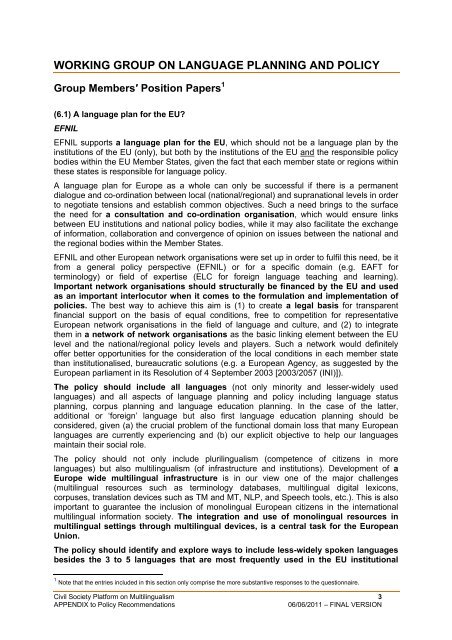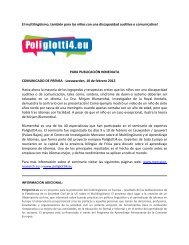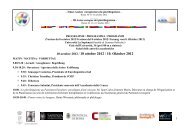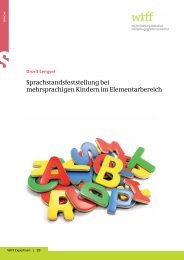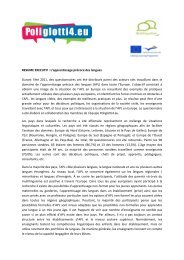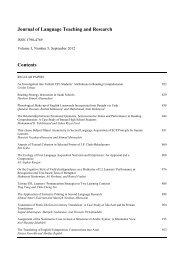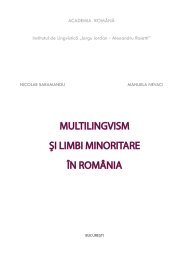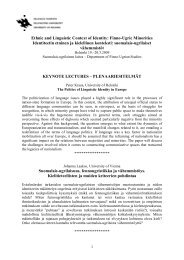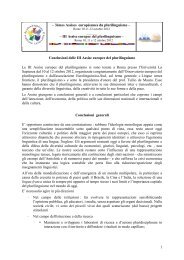FULL VERSION - European Commission - Europa
FULL VERSION - European Commission - Europa
FULL VERSION - European Commission - Europa
You also want an ePaper? Increase the reach of your titles
YUMPU automatically turns print PDFs into web optimized ePapers that Google loves.
WORKING GROUP ON LANGUAGE PLANNING AND POLICYGroup Members′ Position Papers 1(6.1) A language plan for the EU?EFNILEFNIL supports a language plan for the EU, which should not be a language plan by theinstitutions of the EU (only), but both by the institutions of the EU and the responsible policybodies within the EU Member States, given the fact that each member state or regions withinthese states is responsible for language policy.A language plan for Europe as a whole can only be successful if there is a permanentdialogue and co-ordination between local (national/regional) and supranational levels in orderto negotiate tensions and establish common objectives. Such a need brings to the surfacethe need for a consultation and co-ordination organisation, which would ensure linksbetween EU institutions and national policy bodies, while it may also facilitate the exchangeof information, collaboration and convergence of opinion on issues between the national andthe regional bodies within the Member States.EFNIL and other <strong>European</strong> network organisations were set up in order to fulfil this need, be itfrom a general policy perspective (EFNIL) or for a specific domain (e.g. EAFT forterminology) or field of expertise (ELC for foreign language teaching and learning).Important network organisations should structurally be financed by the EU and usedas an important interlocutor when it comes to the formulation and implementation ofpolicies. The best way to achieve this aim is (1) to create a legal basis for transparentfinancial support on the basis of equal conditions, free to competition for representative<strong>European</strong> network organisations in the field of language and culture, and (2) to integratethem in a network of network organisations as the basic linking element between the EUlevel and the national/regional policy levels and players. Such a network would definitelyoffer better opportunities for the consideration of the local conditions in each member statethan institutionalised, bureaucratic solutions (e.g. a <strong>European</strong> Agency, as suggested by the<strong>European</strong> parliament in its Resolution of 4 September 2003 [2003/2057 (INI)]).The policy should include all languages (not only minority and lesser-widely usedlanguages) and all aspects of language planning and policy including language statusplanning, corpus planning and language education planning. In the case of the latter,additional or ‘foreign’ language but also first language education planning should beconsidered, given (a) the crucial problem of the functional domain loss that many <strong>European</strong>languages are currently experiencing and (b) our explicit objective to help our languagesmaintain their social role.The policy should not only include plurilingualism (competence of citizens in morelanguages) but also multilingualism (of infrastructure and institutions). Development of aEurope wide multilingual infrastructure is in our view one of the major challenges(multilingual resources such as terminology databases, multilingual digital lexicons,corpuses, translation devices such as TM and MT, NLP, and Speech tools, etc.). This is alsoimportant to guarantee the inclusion of monolingual <strong>European</strong> citizens in the internationalmultilingual information society. The integration and use of monolingual resources inmultilingual settings through multilingual devices, is a central task for the <strong>European</strong>Union.The policy should identify and explore ways to include less-widely spoken languagesbesides the 3 to 5 languages that are most frequently used in the EU institutional1 Note that the entries included in this section only comprise the more substantive responses to the questionnaire.Civil Society Platform on Multilingualism 3APPENDIX to Policy Recommendations06/06/2011 – FINAL <strong>VERSION</strong>


